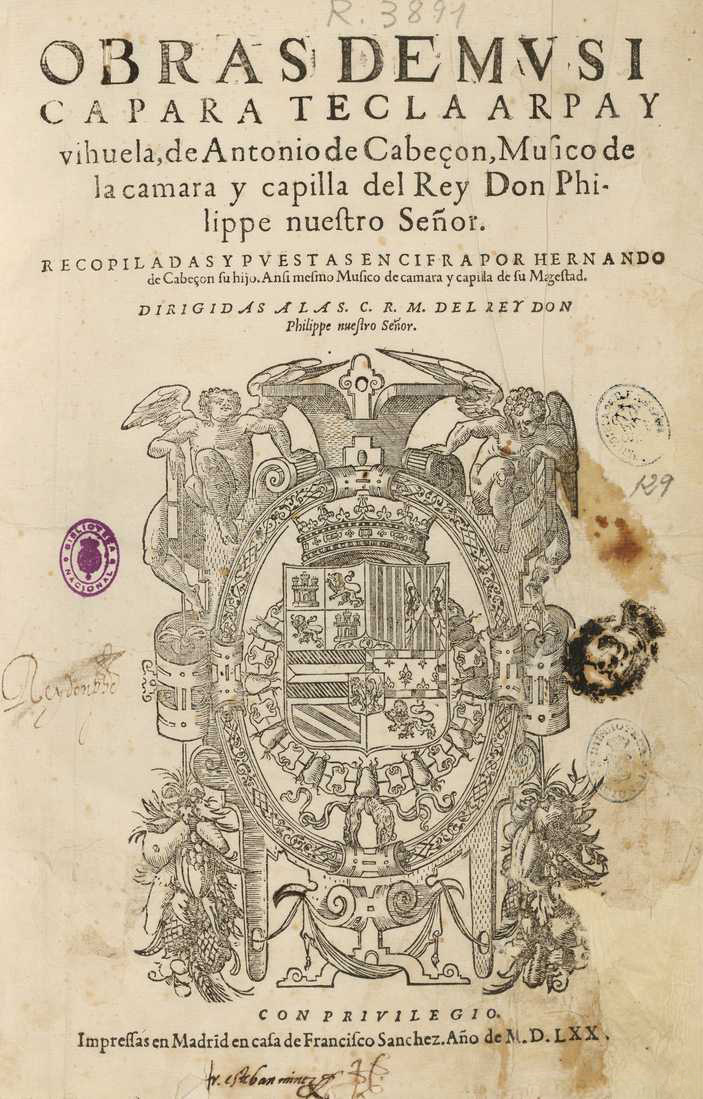Hernando De Cabezón on:
[Wikipedia]
[Google]
[Amazon]
 Hernando de Cabezón, (
Hernando de Cabezón, (
 Hernando de Cabezón, (
Hernando de Cabezón, (baptized
Baptism (from ) is a Christian sacrament of initiation almost invariably with the use of water. It may be performed by sprinkling or pouring water on the head, or by immersing in water either partially or completely, traditionally three ...
7 September 1541 – 1 October 1602) was a Spanish composer and organist, son of Antonio de Cabezón. Only a few of his works are extant today, and he is chiefly remembered for publishing the bulk of his father's work.
Biography
He was born inMadrid
Madrid ( ; ) is the capital and List of largest cities in Spain, most populous municipality of Spain. It has almost 3.5 million inhabitants and a Madrid metropolitan area, metropolitan area population of approximately 7 million. It i ...
and probably studied music with his father. From January to December 1559 he was employed at the royal chapel, where his father worked, as a substitute organist. He was appointed organist of the Sigüenza
Sigüenza () is a city in the La Serranía, Serranía de Guadalajara Comarcas of Castile-La Mancha, comarca, Province of Guadalajara, Castile-La Mancha, Spain.
History
The site of the ancient ''Segontia'' ('dominating over the valley') of the C ...
Cathedral in 1563, and when his father died in 1566, he succeeded him as royal organist. Like his father, he accompanied the court on its travels; this brought him to Portugal, among other places, where he lived in 1580–1581. In 1598, when Philip II of Spain
Philip II (21 May 152713 September 1598), sometimes known in Spain as Philip the Prudent (), was King of Spain from 1556, King of Portugal from 1580, and King of Naples and List of Sicilian monarchs, Sicily from 1554 until his death in 1598. He ...
died, Cabezón went on as royal organist with his son Philip III of Spain
Philip III (; 14 April 1578 – 31 March 1621) was King of Spain and King of Portugal, Portugal (where he is known as Philip II of Portugal) during the Iberian Union. His reign lasted from 1598 until his death in 1621. He held dominion over the S ...
. He drafted his will in 1598 and died four years later in Valladolid
Valladolid ( ; ) is a Municipalities of Spain, municipality in Spain and the primary seat of government and ''de facto'' capital of the Autonomous communities of Spain, autonomous community of Castile and León. It is also the capital of the pr ...
.
Only a few of Cabezón's compositions survive. He is chiefly remembered for ''Obras de música para tecla, arpa y vihuela'' (Madrid, 1578), a large collection of music by his father (also including five pieces by Hernando). The ''Obras'' constitute the single most important source for Antonio de Cabezón's work. Hernando's own works include an organ setting of ''Ave maris stella'' and several keyboard intabulations. All of these pieces are of very high quality, and the intabulations are notable for their rather radical departures from the vocal originals.Apel 1972, pp. 139, 290.
Notes
References
* Apel, Willi. 1972. ''The History of Keyboard Music to 1700''. Translated by Hans Tischler. Indiana University Press. . Originally published as ''Geschichte der Orgel- und Klaviermusik bis 1700'' by Bärenreiter-Verlag, Kassel. *External links
* {{DEFAULTSORT:Cabezon, Hernando Spanish Renaissance composers 1541 births 1602 deaths Spanish male classical composers Spanish organists Spanish male musicians